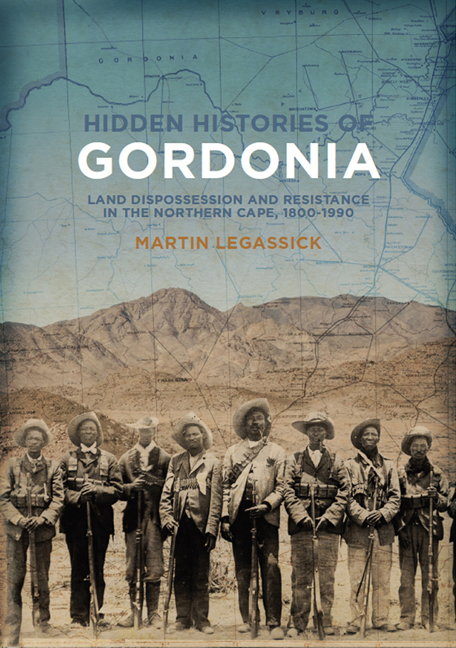Book contents
- Frontmatter
- Dedication
- Contents
- Acknowledgements
- Acronyms and abbreviations
- Illustrations
- Preface
- Chapter 1 The prehistory of Gordonia
- Chapter 2 The Baster settlement of Gordonia and its decline
- Chapter 3 The will of Abraham and Elizabeth September: a struggle for land in Gordonia, 1898–2014
- Chapter 4 From prisoners to exhibits: representations of Bushmen of the northern Cape, 1880–1900
- Chapter 5 South African human remains and the politics of repatriation: reconsidering the legacy of Rudolf Pöch
- Chapter 6 The early history of the brown Afrikaners in Riemvasmaak
- Chapter 7 The battle of Naroegas
- Chapter 8 The Marengo rebellion and Riemvasmaak, 1903–1907
- Chapter 9 The racial division of Gordonia, 1921–1930
- Chapter 10 Keidebees and Blikkies locations, Upington, 1894–1974
- Chapter 11 ‘All my powers have been swallowed by Upington’: the life and times of Alfred Gubula
- References
- Index
Chapter 7 - The battle of Naroegas
Published online by Cambridge University Press: 20 April 2018
- Frontmatter
- Dedication
- Contents
- Acknowledgements
- Acronyms and abbreviations
- Illustrations
- Preface
- Chapter 1 The prehistory of Gordonia
- Chapter 2 The Baster settlement of Gordonia and its decline
- Chapter 3 The will of Abraham and Elizabeth September: a struggle for land in Gordonia, 1898–2014
- Chapter 4 From prisoners to exhibits: representations of Bushmen of the northern Cape, 1880–1900
- Chapter 5 South African human remains and the politics of repatriation: reconsidering the legacy of Rudolf Pöch
- Chapter 6 The early history of the brown Afrikaners in Riemvasmaak
- Chapter 7 The battle of Naroegas
- Chapter 8 The Marengo rebellion and Riemvasmaak, 1903–1907
- Chapter 9 The racial division of Gordonia, 1921–1930
- Chapter 10 Keidebees and Blikkies locations, Upington, 1894–1974
- Chapter 11 ‘All my powers have been swallowed by Upington’: the life and times of Alfred Gubula
- References
- Index
Summary
In the battle of the farm of Naroegas, fought near Kenhardt in the northern Cape on 23 May 1901, a Boer commando suffered a severe defeat at the hands of a force of ‘brown’ people of the Northern Border Scouts. The story of this battle has been buried almost since its occurrence. The text of the present chapter was written to accompany an account by Jesse Strauss, a recovery of the story of the battle based solely on oral testimony from brown people, including his own ancestors, which originally formed part of his manuscript titled Kinders van die Gariep (Children of the Gariep) on the history of brown people in the northern Cape up to the turn of the 20th century.
In the course of my research in the northern Cape, I met Jesse Strauss, read his manuscript, and was excited by the originality of some sections of it, including that on Naroegas. I undertook to try to discover what could be found in the archives on this forgotten battle of the South African War (1899–1902). The following commentary is based largely on the written sources. It places the battle in the context of the war in the north-west Cape, and reflects on the silences and distortions in the written accounts of this war, as well as the ‘hiddenness’ of the oral records of the battle. It argues that the significance of the ‘history’ of the battle lies as much in what it reveals about social relations in the area as in adding to our military knowledge.
The battle of Naroegas: context, historiography, sources and Significance
Yesterday at Naroegas 2½ hours north this Patrol of 60 Border Scouts were attacked at 9am by 94 Rebels. Engagement lasted until 3pm when enemy retired and ceased firing. Sent cart for dead. Rebel losses 15 dead counted. 5 known to be wounded. Commandant Jan Nel severely [wounded and] left behind. One Jacobs rebel from Kakamas brought in. Others left behind. Jooste of Kakamas also prisoner. Many rebel horses killed. 1 saddle, 2 horses, arms and ammunition (explosive) brought in. Explosive ammunition freely used by rebels. Our losses one man wounded. By accident 7 horses killed. Officers and men of Border Scouts fought with great bravery.
- Type
- Chapter
- Information
- Hidden Histories of GordoniaLand dispossession and resistance in the Northern Cape, 1800–1990, pp. 195 - 228Publisher: Wits University PressPrint publication year: 2016



